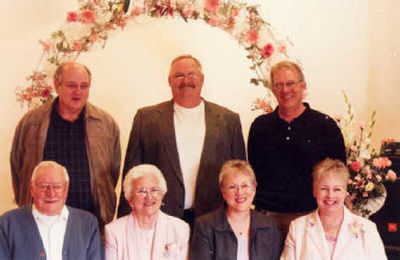William ‘Bill’ Abbott had strong love of family

William “Bill” H. Abbott was a hardworking, honest man who believed in the golden rule.
Treat others the way you want to be treated was the way he lived his life, his daughter Sandra Deehr said. “He was well liked by lots of people.”
Abbott died Sept. 2 at the age of 83.
“I wish he could have made it longer, but he lived a good life,” his wife, Lois said.
Abbott lived a life full of adventure. He was a train engineer for 45 years. He spent three years in the Navy during World War II. And he and his wife had five children, three sons and two daughters.
Abbott was born in Garfield, Wash. He was raised on a ranch in Colfax with five brothers.
He graduated from Colfax High School where his legacy as a football player remains.
Abbott’s face is carved into a wooden pole along with the rest of his high school teammates. The Codger Pole is a memento from when his high school football team played in a rematch with St. John High School – 50 years post graduation. This time, Colfax won.
“That’s Dad’s claim to fame,” Deehr said jokingly.
Abbott left for the Navy in 1942. He was stationed on an ABC-100 personnel carrier in the Pacific Islands.
A story his children often heard repeated was about a foggy night when their dad was on watch.
He was on the deck when he saw a fleet of Japanese ships, his daughter Marilyn Teigen said. The crew had just returned from dropping off troops when Abbott spotted the daunting sight.
“They had to back up the boat to get out of the way,” Teigen said. “In those days the boats were wooden.”
Bill Abbott told his children he thought his unit wasn’t harmed because the Japanese didn’t want to give up their own position.
Abbott met his wife two years after returning from the Navy. He was staying in Colfax with his parents while he recovered from a motorcycle crash, Lois Abbott said.
She was walking down a street with a group of nurses when he passed by in a car with a few other young men. The car turned around when the nurses whistled.
Lois denies she whistled, but she caught her husband’s attention nonetheless.
“It was love at first sight,” she said.
The two met in March 1947. They tied the knot the next month. The couple was married for 58 years.
Lois Abbott said her husband used to joke: “He couldn’t run fast enough to get away, because he was injured in the motorcycle crash.”
The couple moved to the Valley in 1958 where they raised their family.
To support his wife and children Bill Abbott manned the engineer’s booth of a freight train for the Great Northern, and later Burlington Northern Railroad, for 45 years. His route during most of his career was between Spokane and Whitefish, Mont.
A locomotive engineer’s job requires long hours, no set days off and being ready to go whenever the phone rings.
“He missed a lot of Christmases and birthdays,” Teigen said. “And a couple of births,” her mother added.
“But when he was home, he was all ours,” Deehr said. “And he was very interested in everything we did. I played the clarinet … and he always wanted me to practice where he could hear me.”
Whatever it was the kids were doing he wanted to know all about it, she added. The same went for the grandkids.
Abbott’s daughters said a fond memory was when their dad took naps in case the call came to go to work.
He’d put a pillow on the floor, put on music such as Chet Atkins, and take a nap.
“To this day I still love that music,” Deehr said. Her sister agreed.
Bill Abbott’s wife said the only downside of driving a locomotive was the tragedies he had to witness.
“He saw some deaths as a train engineer,” Lois Abbott said. “The death of a 21/2 -year-old girl haunted him the most. He never wanted to talk about it.”
Teigen said her father warned all the kids to never try to beat a train off the tracks. To emphasize his warnings he told them: “If you get killed by a train, I won’t come to your funeral.”
After retiring from the railroad, Lois Abbott said her husband’s first hobby was family, but he also enjoyed golf, bowling and reading about history.
Deehr described her father as the type of person you could count on whether you were his neighbor, friend, co-worker or child.
“There was always someone he was taking care of,” she said. Widows who lived next door “could always count on Dad to come help them.”